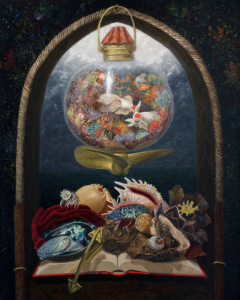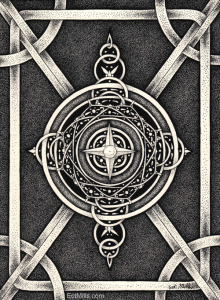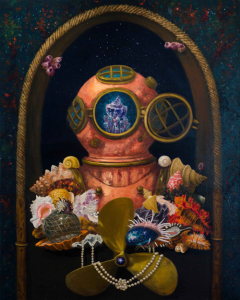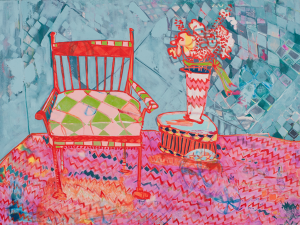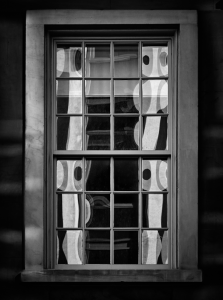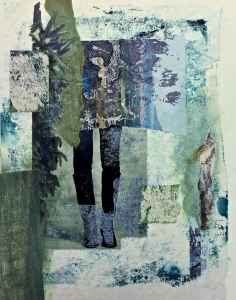1.
She kept reading about how all the paper houses had burned. But as she came down out of the clouds, she saw shiny fields, wet with a sheen of green water and the spikey hills she remembered. The villages tucked into crevices between the islands of trees and rocks and fields. There were certainly paper houses hidden along the shining river. And more were folded in the curves and lumps of the hills. Long white birds announced their presence with their silence and the squat bodies of cormorants raced down the dark rivers once she got to the city. Everything was different. The last few years replaced with concrete that somehow seemed more alive than she remembered. So the woman who told her about the fires was right. The houses had vanished. In the morning she watched as armies of pedestrians marched to work. Their faces placid with sleep. One eyebrow raised here, another foot placed there. Such precision and pizazz. Every now and then someone would break rank and get a coffee at one of the cafes, mildly folding and unfolding a paper. Picking a white cup off a table and then putting it down.
2.
She ended up on a street with noodle stalls. None of them had any faith. She knew, after all, that they had to kill Jesus for him to be a savior. Military men were at every corner. And the large blue fish in tanks displayed along the walls slept. She could see them breathing in the dusk of their containers. Men in white shirts and black pants jostled against each other, banging their brief cases on their thighs. Everything was lit with a burning core. These men had been at work forever. Toting their bags from home to trains to the office to the narrow streets where the food was displayed on plastic cards or in bowls with plastic wrap. Old women beckoned costumers in at the doors. Huge signs with beautiful letters hung from every open window. So many drunk men rubbing their bellies, dancing in knots close to each other just about to fight. No English here, one sign said. Inside the stall it was quiet. A cook cocked his head and looked away. It was cool, so cool she pulled her sweater closer. She’d left two grown boys and a husband in a country far away, governed by an idiot in a red coat. Everything was alive around her and no one was quiet.
3.
Her new boss said I’m part Cherokee and part Quebecois. I have great friends all over the world, some from my youth hanging out at Johnson Pond. I have many more friends than you do and have held important positions. I’m a denizen of this place, a wow guy, why do you think I got this job? Look at my desk, my legions of pictures of families close to me, for sure I’m close to my brother and sister, too. We get together every year in Maine. I’ve lived most of my life away, but you know Maine is certainly what I call home. An old house on the green, the view of the ocean from the porch, the sound of gulls in the morning, the children skating on the pond in winter, the smell of woodsmoke. My history goes like this: I, like you, have moved from institution to institution always here, mostly here, but bigwig positions, nothing less. Have you had a stroke, he asked, I know I may have seen that in your documents. Are you sure you haven’t had a stroke? She adjusted her smile and said, it was a mild one, a mild one. I have no visible residue. But she knew residue was not the right word. Visible signposts, perhaps, a certain look, the way her family inserted one word or two when they had a chance, the way her little dog looked at her with distrust. It all got to be too much. That country so far away, their loving hands guiding her down stairs, past beggars in the street and gangs of motorcycle thugs prowling the boulevards where they lived. They went to a place in the north one winter soon after her stroke and stayed in an inn where the sheets were very white and they left chocolate on your bed at night. So sweet. They ate in the dining room and she brought her little white dog with her. The dog slept under the table and she could see other holidaymakers snatching looks at her from their beautifully set tables. There were people singing in another room and lights twinkling in the trees outside. Her husband and sons were happy, skiing during the day, and she could sit on the little porch in the sun with her white dog and think about nothing, nothing at all. There was no struggle to find any words. She was in the first months of her therapy and it was difficult to say anything. She could hardly smile. Don’t worry darling, her husband said, we’ll get you back to normal in no time and she would shake her head. She knew there was no normal around the corner. Her therapist had her draw a clock and she knew from her face, even if she said that’s great Gigi, that’s great, that she had somehow gotten it wrong, terribly wrong. She studied flashcards and did homework for what felt like hours. She was instructed to substitute one word for another, but she’d never been much of a poet and isn’t that what they did? She used to love to tell stories and she could see the painful look on her younger son’s face when they were all silent at the dinner table, her boys back from one college or another. One job or another and it was her husband, who used to be the quiet one, who carried the conversation like a suitcase.
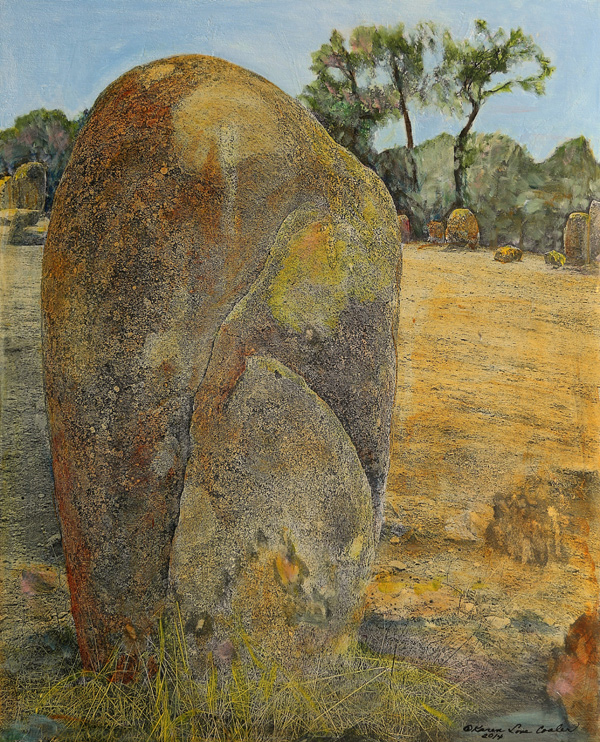
4.
She had days before the program started so she went to a garden. She had admired this garden in books for years. When she was in this country years ago she was more interested in the mechanics of love than gardens. A brief affair, a few weeks of doing nothing but fucking on the floor in a narrow apartment where everything was miniature. It took her weeks to realize she wasn’t in love at all, just enamored of the idea. It was so far away, so far away from the kind of life she normally lived. And she loved the burning bite of sake and how it made her feel. How loved he made her feel, split off from the self she thought she knew, even if she didn’t know what she was capable of doing. She didn’t know that later when she had her stroke, years later, she wouldn’t know who she was at all and the sorting chambers of her brain would disintegrate so she couldn’t even talk to her little dog. Her little dog who she sometimes thought she loved above all else, her little dog with the pure white paws.
It was a garden of Waka poetry. The paths circled the pond in the middle of the garden like a magic incantation. Each viewing spot was a bell. A way to inspire memory. A key to the locked room where the words lived. Precious Seaweed Shore. Her days at the Cape with her mother and father and her brothers and sisters. The days burning to a crisp on the sand, cold as hell in the water. Those hours playing in the brook that went down to the sea, the horseshoe crabs moving so slowly along the bottom, waving their blunt spears back and forth. Her brothers stoning the rabbit to death one day when they went to visit cousins two towns away.
Ebb Tide Harbor, her life now.
It took her months before she could draw the clock on the blank piece of paper correctly. Now she watched a man measure bamboo stakes precisely and then saw them off and then hammer them with a wooden mallet into the ground along the edge of the mossy verge of the lake. He measured three times and then cut. She watched him happily. She was definitely happy, sitting on the wooden bench in the old garden. Very old, she knew, early 1700s. Two of the ponds were gone now, but the impression of the water on the surface of the earth remained.
5.
She wanted a resurrection. She knew that was blasphemous to want to so much. She wanted to be struck new with life. Instead God sent her lightening in her brain. And even if the doctors kept saying she’d be fine, she didn’t think this state was fine. She was such a talker. She could talk the ear off anyone, couldn’t she? Her sons knew that. And as she traveled more and more with her husband and they could do anything they wanted, she had so many stories to tell.
When her mother got sick it was up to them to take care of her, first in her older boy’s room and then in the facility down the road. It was a place with trees around it. The only place in miles with a grove of trees. Her mother didn’t care at that point that the two rooms looked out at trees, but she did.
It just seemed too much some times. The world was crumbling at the edges. A tyrant had taken over the country and the government was in shambles and then her mother started to say less and less. A kind of imitation of Gigi’s stroke, but much worse. She wouldn’t come back from this descent into silence.
She brought her meat sauce in a silver thermos. Morsels of chicken in foil. Beautiful sweet ripe clementines. Armfuls of farmer’s market flowers. Her mother stopped eating, her mother stopped moving, her mother stopped doing anything at all. And what was there to do? Her mother didn’t remember the soap operas she’d spent her life watching or the news at 6:30 or anything really. She was afraid she would forget who her daughter was. But she didn’t. Her sister came and stayed with her those last months. Her mother took forever to die. She’s just doing it on her own time, the kind nurse with the polished copper skin and tiny eyes told her. The books can only tell you the average time. The average time was two weeks, her mother wanted ten months and she took it.
6.
She’d had a bitter fight with him before she left. Her husband said, “I sacrificed all my waking hours to your rehabilitation and this is what you want to do now that I’ve got you back?”
“I was still myself, when you thought I wasn’t here,” she said. “I was still myself all those hours when you were away. I was with the boys in my heart, wasn’t I? I fought hard to get back to what you thought you wanted me to be.”
But it was all so dramatic, she thought. The simple thing was there were two of her now. The woman he’d loved for so many years and the one who went away. Went away in her head, all the words mismatched, unavailable for the moment. Not useful.
“You’re not the same,” he said, “not the same at all if you keep this cockamamie idea in your head and leave us again.”
“I can’t believe you said cockamamie,” she said and then they started to laugh. Everything was so ridiculous after all. There was the tyrant as president, the marches in the street, people with different kinds of hats parading in every town, marching and chanting. Flags waving on every corner. The terrifying blasts in even places you’d think would be safe. Knife attacks on subways. It was a relief to be somewhere like where she was then. Military men, and sometimes women, stationed at subways and street corners and outside of train stations to guide your way. The soft patter of rain, now that the monsoon season was warming up. She was not in the same world, but it didn’t matter. No one knew who she was before and she’d gotten the job on her own without the help of her husband or sons or even her little white dog, who she missed terribly.
She’d taken the train to a part of the city with twenty temples. Arched wooden temples with deities who might be sympathetic to her. It was kind of Zen to walk slowly around the village on her own through the vast cemeteries and narrow streets that were spared war and fire and bombing. The hydrangea were in bloom. Delicate lace bright blue like the sky. She met a girl with an owl. A pet owl, three months old. A baby, the girl told her. For a few yen, she could pet it. But it was enough to look at the owl as the bird swiveled her head back and forth. The soft whirl of spotted caramel feathers around her face. The owl’s deep black eyes shining as she looked into them and the owl didn’t flinch. The bird was perfectly calm. There was a world there that was very different from the one she’d fled. Serene, astonishing, filled with peace.
7.
She talked to a man at the faculty meeting who told her she should get a car, borrow someone’s to go to the big international store at the edge of the city. She could get chairs there, you could get anything really. It was stupid to take a train or a bus there, it didn’t make sense. After all what were cars for, if not to transport people to places where they could buy things, he laughed. He was thin and wore a white tunic. He had beads around his neck and his hair was as white as his clothes. Everything about him was impermanent, a little foggy. She could hardly hear him when he spoke. I used to teach physics, but now I teach music and yoga. Like the music of the spheres, she said, so that makes sense. He leaned in close to her, yes. The room was filled with men. There were hardly any women. She followed a man with an umbrella out of the building to an annex across the narrow street up the elevator. Are you one of the faculty she asked, or a parent and he said quickly, I’m the CFO. You’re a bigwig, then, she said. When the door opened he vanished down a corridor and shut the door.
A woman in the business office opened a brown packet filled with the first edition of her pay and fanned the money out on the desk in front of her. The solemn faces of someone famous in this country glared at her from the surface of the gray desk. There were so many shades of gray in the city.
She was making a garden on her balcony. It was just big enough for several small pots and it looked out at the canals. Someone had planted a spring garden along the paved walkway that ran along the bank. She was on an island of concrete in the concrete city. One man at the meeting told her during the last earthquake everything swayed and then was still. He likes to wear women’s clothes, another man told her.
8.
At one of the temples she visited she put coins at the foot of several minor gods who wore pink caps. They were standing guard along the fence to the temple near their leader, a much larger statue with a pink apron around his neck. There were crows the size of eagles carrying pieces of toast and little birds who flew through the towering trees faster than she could imagine. She missed her husband. He would have laughed at the pink hats. He was pretty irreverent about everything. A woman was pushing a cart filled with willow brooms and wooden buckets marked with black calligraphy. For holy water, she thought. Bouquets of fading flowers defaced the graves. Why didn’t someone take them away once they started dying? Bundles of wires crisscrossed the sky above her head as she walked into a tiny alley where they were selling juice and puffy buns with cream. She hadn’t been hungry in such a long time, but the buns were soft and warm in her mouth. It was a relief to be alone. She didn’t have to search for the words she wanted, she could let whatever came to the surface be what she wanted to say. Penguin. Pigeon. Parrot.
9.
Men with white gloves drove the cabs in the city. The seats covered with white lace. The white ghosts followed her when she went to the 100 yen store where the checkout person, a lively woman, told her there were so many foreigners in the neighborhood, or took the little bus to the hills north of where she was living. When she was watching her mother die all those months, her little white dog came with her. She waited for morsels of food her mother dropped on the rug or the crumbs from the tiny pieces of bread her mother ate. One day her dog noticed something on the ceiling. Her son thought it was angels. The angels come to lead her mother to heaven. She laughed, “Really” she said. “I didn’t think you believed in any of that stuff.”
“Really mom,” he said, laughing, “look at the way Tinker’s acting.”
She was acting strange circling her mother’s hospital bed, sniffing under the covers, whining at the ceiling. It was comforting in a way that angels were there to help her mother, when no one had been around when Gigi’d had her stroke. She was making lunch, something heated up in a pan. A strange thing to do, but there it was. Lunch was in her hand, she was walking across the kitchen, her beautiful white kitchen with jars arranged on the shelves, and the shining silver refrigerator, and then she fell. Lightning and then nothing. When she could see again she dragged herself across the kitchen floor to the hallway and then to the living room. Her phone was on a table in the immaculate room. It took her hours to reach her phone and when she got through to her husband all she could do was make a noise, a simple noise that she thought sounded like help me, but her husband said much later, months later, was more like a croak.
10.
It was hard to go a day even so far away from where most of her life had been without her mother appearing in some way before her eyes. She’d been persistently haunting her for her whole life. A woman who wanted perfection in everyone but herself. Gigi took the little bus to hills north of where her apartment was in the largest city in the world. The librarian at the university had told her about a museum with a small, perfect garden. She walked aimlessly in the direction of where she thought the museum was past women with their perfect faces, their gloved hands clutching bags from expensive stores. Each one accompanied by her mother. A woman who was an older version of themselves, but just as perfectly dressed in shades of cream, or gray or delicate floral.
On the bus, she’d met a woman who told her how to get to the museum. I’m going that way, I’ll show you, she said. Her English was impeccable. They walked quickly along the wide boulevard. “And you live in the dormitory of the university?” the woman asked.
“No,” Gigi laughed. “I live near the bay, in an apartment.”
“How nice,” she said. “But you’re very brave to spend the summer in Tokyo.”
“The heat?”
“Yes,” she said. “The heat, the humidity. It’s really quite terrible.”
“What do you do?” She asked the woman, who was wearing navy. Her short stylish hair framing her face.
“I’m a guide,” she said. And she laughed. “I’ll leave you here, I’m going to the market. Have a wonderful summer. You should really stop at the market after the museum. It’s my favorite museum.”
She wondered if everything in her life was an echo of her mother and if, since her mother’s death, everything was a shadow of that same echo. In the museum she spent an hour studying many hanging paper scrolls with squares of poetry framed by paper, adorned with gold flecks. Saturated with the color of the sky or the moon or the sun. In another room there were tea bowls with names, famous tea bowls celebrated for their misshapen beauty.
There was a Buddha in the garden sitting quietly when everyone else was circling the garden, taking pictures. The Buddha sat on the edge of the flowing stream, before it cascaded to the pond where two turtles overlapped on a rock. Stretching their green streaked necks out, sunning. It was much cooler in the garden, she wished she’d worn a sweater.
11.
She met her new boss again in the street when she was looking for lunch. He was pushing a bike. A young woman, very beautiful, was trailing behind.
“How are you?” She asked.
“Great. I’m going to work out and she’s going home. You know they’re here to review me. I thought I’d look for a putter. When those meetings are taking place on Friday, I’ll be playing golf with Fred Olson. But I need a golden putter. When I played with Tony Mashimito he had the putter to end all putters and he beat me like that. He gave a ton of money to the school. I want to be ready this time. I’ve got to step up my game.”
There were children all around them as the young woman smiled shyly. She was dressed in a silky flowered frock. He was in a polo shirt and shorts. His bike was black. His teeth seemed to be broken, or cut off at the ends. Such an unfortunate mouth. She couldn’t imagine him kissing the young woman who walked behind as he pushed the bike. But you never knew about these things.
12.
She knew her mother’s body too well after those months taking care of her. She would guide her into the shower, turn the water on and then hose her off with the handheld shower. Her mother’s skin was still firm. The pounds she’d accumulated over all those years of life gleaming on her bones. After those months in the facility when she refused to eat, things changed.
She wakes to bright light, almost burning white here, very early in the morning. At the Cape when she was young, not so young, just after she graduated from college, the first time she had a hard time calling up words, she would visit her aunt and uncle and stay in a bedroom in the basement. Right on a marsh. It was the light then that called her to the ocean. A brilliant burning on the waves, the salt spray on her tongue in the morning. A kind of crystalline definition of the birth of the day.
The city presses down around her after her days in the foreign country. The ambulances politely calling out to pedestrians to please move away from the vehicle, the women in the department store showing her all the attributes of the pillow she wants to buy anyway. They instruct her to try it out, her head on a piece of gauze covering the pillow, her feet placed on a sheet of plastic at the foot of the bed. When the transaction is finished the two women dressed smartly in tailored clothes, like a uniform, bow and thank her over and over again.
It’s the time of the year when trains are delayed in the city. The electric screens in the subway announce passenger injury several times a day. Or antelope on the tracks. Gigi thinks it’s a problem with translation. Could there really be antelope in this country? The term passenger injury means someone has jumped. It’s just a euphemism for death, several people at the faculty meeting told her. It’s a bad time of year for that. The raining season coming up, the brutality of the spring. Everything blossoming. New life. She’d read in the news that pigeons had been arrested for carrying little backpacks with pills sewn into the fabric. The backpacks were miniature and fashioned to look like their feathers. The pigeons didn’t know they were drug mules. They just loved to fly.
13.
In a prefecture north of the city there were radioactive wild boars. Thousands of animals with blunt noses and fierce eyes. Hundreds of hunters had tracked them down and killed them but not enough to clear the cities. She was curious. Her days in the sparkling city were lining up into something she couldn’t define. It was the first day of classes. Someone was pounding on the floor above her apartment, shaking the ceiling.
A friend had lost her husband once in in the aftermath of an earthquake. She was visiting a place where they were building a beautiful resort on the sea. Her two girls were with her. She and her husband had gone to take a look at the resort. The girl’s godfather was part owner. The girls were up in the hills with a friend exploring. When the tsunami hit, their parents had to run for dry land and their father spotted the skeleton of a building. He led a group of people wearing only their bathing suits to the top floor. It was too much for him and he died there, already prone to a weak heart. Her friend had to cover him with someone’s flowered wrap and leave him there while she searched for her daughters. She thought she’d lost her family to the water.
“I didn’t know if they were alive,” she told her. “Until I heard from a friend who I met days later that the girls were with another friend, safe and well in another part of the island. It changed everything for me. And then we all went back to the place where Andrew died and brought his body into town.”
14.
One of her students, a solemn boy from India, told her he almost died climbing the sacred mountain. You were supposed to be able to see it from the city, a perfectly shaped cone with snow on the top. But she’d been lost in the concrete caverns for days now and couldn’t understand how you could see the mountain from the city. It rose up, she knew, from the plains below. A stark reminder of the majesty of geography.
Her student, Goreesh, was climbing the mountain with six friends. They were ill equipped and cold by the time they got to the shoulder of the mountain. There was a hut where they paid a huge amount to sleep on hard pillows and wrapped themselves in one thin blanket. He was not feeling well. Maybe it was the altitude, he thought, and his friends wanted to give up. But he went ahead in time to see the sunrise. He was so tired, he told her, that he slipped at the edge of a ravine and was almost never heard from again. And he was so young. His mother would have been bereft and his friends very unhappy, but he caught himself and they all went on to reach the top. It took them 18 hours to climb the mountain.
She was thinking perhaps she should tell the man she’d met at the faculty meeting that she would take him up on his offer to find a car. She wanted to go somewhere, anywhere out of the city. Was there something wrong with that? She was thinking she wanted to go to the prefecture with the wild boars. There were deer there and hawks and other animals gathered in a place with lots of grain and fruit trees and tender shoots to eat. A ripening away from human habitation. She thought it would be interesting to catch a glimpse of that. The authorities were trying to convince the people who’d fled to return to the place they’d left.
Her husband had been calling her, trying to convince her to come home. “You can use your health,” he said, “as an excuse. Tell them you didn’t realize how stressful the trip would be.”
“But I’m fine,” she said. “And I don’t want to come home yet. This is important to me even if you think it’s stupid.”
“I’m not important to you?” he asked. It was his night and her morning. There was no way they could talk about this. It was yesterday there and today here. They were not even on the same globe, somehow. She heated up the water on the stove. Watered her collection of plants on the tiny balcony while it heated and looked down at the canal flowing in and out of the bay. The bay was once barricaded from foreign ships.
Her long rehabilitation had seemed like it would never end, but she was passionate about being able to talk again. And she did, but not in the way she thought she would.
15.
If there was a story to tell she couldn’t remember it some days. And what of the man with the white hair and the white stones around his throat and the white clothes. What was his story, she wondered, as she walked past the temple and then up the hill that wound pass the Friends School and the expensive looking houses and tiny gardens to the boulevard that led to her apartment. Everything was miniature in her place. The chairs, the lamps, the glasses, the forks. That’s what her mother’s life was like those last weeks, something that had spread out to several houses and states and countries and shrunk to one room. A bed, a chair, a TV she didn’t watch anymore, a sink, a toilet, a brush.
Sometimes there was music that came out of thin air. Like the words she lost all those years ago. Or was it so long ago? There were children with pink hats holding their mother’s hands as she came up to her building. A monk kneeling in the garden, touching the roses one by one. A man feeding two cats by the canal. Was everything a gesture of something else? Her mother’s hand fading in her hand as she watched. Her eyes disappearing. Everything sinking into the white sheet of the bed, until finally even her teeth seemed to have disappeared.
17.
What are you doing up? She texted back to her son.
Woke up. No reason, he texted back.
How are you?
Fine.
Just fine mom?
Great. Really great, she texted and added a heart.
Love you mom, he said, miss you.
Miss you sweetheart. Nite nite
Nite, mom.
It was her sons she thought of when she thought she was dying. She wanted to go back to the time just after the lightening. Just fall back into blackness, but the thought of her sons pulled her across the floor and into the bedroom where she’d left her phone. Just that thought. Her love for her sons. She didn’t want to leave them just yet. And though she loved her husband dearly, it wasn’t the thought of him alone that pulled her back to the living. Not that at all.
18.
He’d always wanted to go off to the wilderness. When he was in high school it was the west. He’d talked a friend into driving with him to Oregon. They took three days driving nonstop. And it was wild out there. Trees packed into the land along the ocean as thick as thieves. They camped near the beach even though it was illegal. What did they care. They’d grown up in a town not far away from a place with perpetual underground fires. The catacombs of coalmining. He studied physics because it was a language he could understand. It translated the wilderness into numbers. There was something comforting in that. Evidence that there was still mystery in the world. Why did he fall out of love with that language? He supposed the woman he met at the faculty meeting was right. It was just a continuation of his obsession with the music of the spheres that pushed him into yoga and dance. He fingered the beads around his neck. You’re just an old hippie, that bastard Bryan, had said to him yesterday. He could hear the big headed jerk telling a student even though he had a letter that said he could miss as many classes as he wanted, it wouldn’t stand up in his class. Anxiety was no excuse.
He’d been in this country now for how long, Bryan had asked him, and he still hadn’t achieved enlightenment.
It was the path that mattered, Richard thought, the path was the only reason for anything, wasn’t it? Right now he was hell bent on getting to see those radioactive boars and the wilderness grown up in the prefecture. He’d heard that Chernobyl was the same way. The animals taking over the landscape, even though the radiation was off the charts in their bodies. His tea was cool now and he placed the cup on the low table in his apartment. It was the beginning of summer. The morning light blazing at 5 on his face as he sat on the narrow balcony and looked down into the water of the canal.
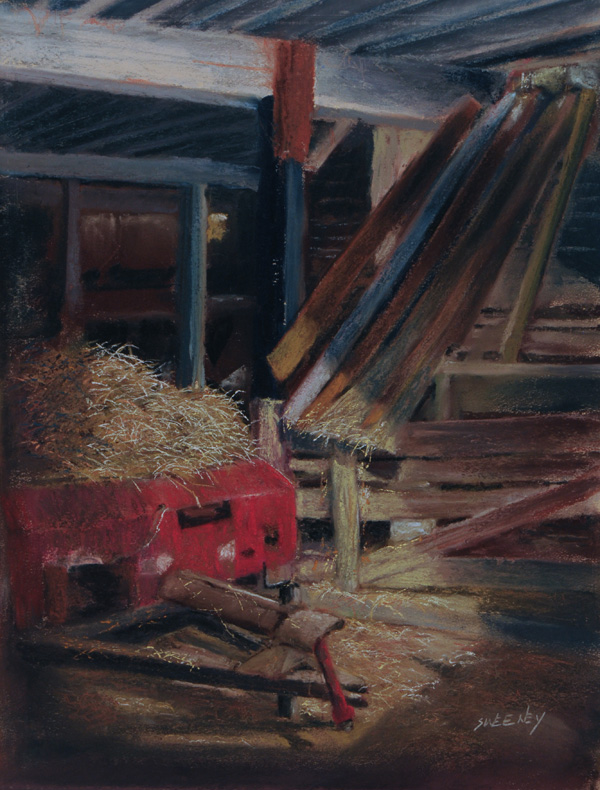
19.
She woke every morning with all her molecules lit. That’s what it felt like. Her body more alive than it had felt in years. The whole city was on fire. Fire bombed, fire forged from disaster at one point or another. And then shaped again with concrete. When she walked along the canal she saw men sitting on benches before they went to their offices. Their eyes closed, leaning against the back of the bench or bent forward, the slim egret and brave heron slicing past them in the air. One man bent over his dark trousers fanning his legs with a paper fan spread wide, picking lint off the dark fabric, another fed two cats crouched by the edge of a building. On her way to the university she passed a shrine. She could hear the monk beating a drum with a stick, a ringing sound that filled her with peace.
It was such a long time before she could put a sentence together after lightning struck her that time. After her stroke. Her therapist had sheet after sheet of exercises for her to do. Filling in sentences like a fourth grader. Dredging up grammar from the depths of her brain. Sometimes it felt like there was nothing there anymore. No word for key, or apple, or car. The trick was to search for nearby words that might give someone else some idea of what she wanted to say. It was a game. A trick. A way to pretend she was normal.
She stopped teaching. It was difficult enough to remember the word for son or husband, let alone plinth or column. But here she was teaching the history of art to five students from all over the place really. In the city for one reason or another.
“It’s such a short course,” she said to her husband and sons. “I’ll just be away for a couple of months.”
“That’s a joke, mom,” her older son said. “You’ll be most of the way around the world.”
“You’re so bored with us you want to get that far away?” Her husband asked and laughed. He was stirring sauce on the stove. Her older boy was setting the table. Jobs she once did without thinking.
When the occupational therapist had her make tomato sauce, she couldn’t remember how to use a spoon and picked up the smallest knife to stir the pot. This interchange of one thing for another was maybe not so bad. What did it matter anyway? In this country you used chopsticks.
20.
She passed a green phone booth almost every day. You could make a call there to someone in this country or internationally. She couldn’t remember the last time she’s seen a call box in her country. Country of ignorant men, country of tyrants and cars. Country of hate, country of bores. She wanted to make a celestial call. Every day she thought about her mother. What a strange thing to do. Her mother had been a pain in the neck, really, but still she was her mother and she missed her like she’d miss a hand or a foot or an ear. In all the stories she’d read there was a way to get what you wanted. And even if you failed, the story was the challenge. She wasn’t sure what she wanted anymore. For so long it was to talk again, to be part of the conversation.
Even if she opened the door to the phone box she wouldn’t know her mother’s number wherever she was. It was unlisted surely.
She passed a little girl with a pink hat as she walked away from the phone. She passed a man playing a song on a harmonica, something from a Broadway musical. She passed a little dog with soft pointed ears and bent to pet her. She’s six, her owner said. She was the first person Gigi had encountered on her walks who spoke English. She’s so cute.
She could feel the dog’s bones through her shining fur.
She passed a woman with orange shoes walking two dogs on two leashes who had bright orange booties. She passed the gray birds quarrelling in the trees along the canal and a woman picking berries from a bush.
If she picked up the phone and heard her mother’s voice what would she say? There were so many things to tally up as mistakes or losses. But here she was in a country that had lost so much. Whole cities obliterated, wiped clean in the war.
21.
“I just like reading,” her student said. “I don’t watch TV. I’ll be reading and the tea will boil or the dog will want to go out and I just can’t put the book down. The phone will ring, I still have a landline, or the doorbell will chime and I just can’t put the book down. The house will shake, or I’ll have to go to the bathroom, and I just won’t put the book down. Even when my father died, I couldn’t put the book I was reading down. It was about a princess. She’d fled to the mountains with her brave samurai general and a loyal handmaid. Her father had raised her like a boy instead of a girl. She was real swashbuckler. Prancing around in the mountains, her gold hidden, her dynasty in ruins. The samurai had offered up his sister, disguised as the princess on a platter, to save the royal line. The revolutionaries thought they had killed the princess and let down their guard. This was in oh, I think, about 1600, so it was cold in the mountains and the princess was hidden in a cave. She wasn’t content to stay there, though, and spent much of her time thwarting her own attackers, two peasants who had stumbled on two bars of gold in a stream. It all ended happily. That’s what I’m most worried about. Will everyone make it alive out of the story and get back into their lives.”
The student was from somewhere in England, somewhere in the north, Gigi thought. She was round like a ball and her head stood on top of her shoulders framed by blond hair. One of the other students, a boy, was her friend. He had tattoos down both of his arms, an insignia like an anchor on his neck. They needed the course to fulfill their art requirement, but they weren’t really interested in the subject. Gigi tried to make it interesting by showing movies and slides in elaborately constructed powerpoints. Her husband had helped her put things together before she left. Just follow the word on the powerpoint and you’ll be fine, he said. They don’t know the difference between a portico and a plinth, so it won’t matter if you mess up now and then.
She knew she didn’t tell her husband enough how much she loved him. That was the problem, wasn’t it? She was afraid he’d wake up some morning and realize he had poured so much wine into her chalice and all she did was drink and drink and never distribute the goods to the congregation. She didn’t say thank you enough for the hours he spent drilling her on vocabulary or the walks up and down the corridor of the rehab place until she could walk straight and not list to the side. Until she could get up off the floor on her own and the director said she was certainly ready to home.
Her student pulled a flowered kerchief out of her bag and wiped her face. Her friend laughed. Just like the woman on the train, he said. Not quite, she said, and tucked the piece of cloth back into her cotton tote.
Gigi had watched a mother and daughter share a handkerchief on the train, too. It was something people seemed to do in this country. The had shared hand lotion and then used the cloth to wipe the excess off of their hands. It was such an intimate thing to do. She had never had that kind of relationship with her mother. Her mother was always the princess. Her sister the handmaiden. The night before she’d dreamed of her mother, young and beautiful on the arm of her father. They were going to a party. She smelled of the spicy perfume her mother always wore. Her lips were painted bright red. She wore slim shoes. Her father smelled of aftershave. They were all glitter. Her brother had a tantrum after they left, and she told the babysitter to just ignore him. He’d turn blue and then settle down. He wouldn’t choke to death.
22.
She found, by chance, a small shrine tucked into the corner of a lane. It was a surprise that there were still these crooked lanes in a city that was so big you could drive for hours and still not escape it. She’d had a conversation about escape with Richard, her colleague who taught the music of the spheres. He really looked angelic, she thought. Spare, white, robed in the lightest of clothes. A kind of Zen impression of a catholic angel. He was one of the few people who seemed at all interested in her. Which was just as well. When she was anxious it was harder to call up the words she wanted. Her students were an incurious bunch of kids, so she hardly ever had to answer questions. She just walked herself through the information on the slides and pointed out the important details of whatever piece of art she was talking about and everything went smoothly.
The shrine was reinforced with concrete, covered with wood. Incense was burning. It was in the cool corner of a shady place. She’d read that the deities with the pink caps and pink bibs were in memory of lost children. This deity had a stained bib, the same kind she used on her two boys when they were babies. There were fresh flowers and sticks of incense in a little box. She slipped a coin into the slatted box at the foot of the shrine and picked up the slender stick of incense. She had lost a baby before her two boys were born, one and then the other not long after the first. It was a surprise to get pregnant so easily when she was not that young and then it was a loss so great she thought she wouldn’t recover for an instant when she sat with her husband in the waiting room and the doctor told them that the baby was gone, the slip of child just disappeared on the ultrasound.
Richard had told her he wanted to drive north to see the wild boars in the prefecture that had the earthquake and tsunami a few years ago. It was sort of a wacky thing to want to do, he told her, but then he never had much of a liking for normality. Even growing up. That’s probably why he ended up leaving the country even before things got so bad. He thought if he had stayed he would’ve ended up in jail, certainly, since that’s where most of his relatives worked. The huge buildings that took up so much space near the town where he was born.
23.
He only wanted to write about himself, her student told her, how his brain was on fire. How he couldn’t escape the thoughts in his brain, like someone hitting on the wall in his room and shaking it minute after minute. He wanted to clear out who he was and become someone else. He’d thought he would be a filmmaker, but that didn’t look like a good idea. He just didn’t get along in groups. He couldn’t talk.
“But you’re talking to me right now,” she said.
“Yes, but it’s just you and me.”
He wanted to be screenwriter, he thought, then he could work alone. She didn’t want to tell him at that point, the fluorescent bulbs in the classroom humming, shades tilted to let in the blazing light of noon, that everyone had to talk to someone unless you were a hermit and what chance was there of doing that in this place or this time?
She had gone to a poetry reading with her older son not long before she’d left the country and the poet told a story about his boyfriend who was living for a few weeks in a community of people who raised their own food, meditated on their lives, and went off into caves now and then to think. It was in the southern part of the country. A place where she was afraid once hiking in the woods and she had to avoid a man with gun who followed her for miles. Tracked her like a deer. The police called the poet, who wasn’t as famous as he would become, and told him his boyfriend had committed suicide. It wasn’t anything the poet expected his lover to do, so he called the coroner’s office and had the report sent. Suspected suicide, but several irregularities, the report said. Someone at he sheriff’s office said, No, it was definitely a suicide. The poet was even more suspicious and composed poem after poem about the tragedy. Years later filmmakers got interested in the case and read the coroner’s report and then interviewed the coroner. The poet’s boyfriend had been tied up, beaten, and then burned. It was certainly not a case of suicide.
Outside her window she could hear the blackbirds chattering on the trees below the balcony that lined the canal. They were squeaking and whistling, arguing over the berries that looked like mulberries. She had read the last empress of the country had raised silkworms and had her subjects spin silk. The empress also wrote 30,000 poems.
When she told her son, he said, “But mom, they were very small poems, weren’t they? It’s not like she was writing epics.”
Sharon White’s book Vanished Gardens: Finding Nature in Philadelphia won the Association of Writers and Writing Programs award in creative nonfiction. Boiling Lake, a collection of short fiction, is her most recent work. She is also the author of two collections of poetry, Eve & Her Apple and Bone House. Her memoir, Field Notes, A Geography of Mourning, received the Julia Ward Howe Prize, Honorable Mention, from the Boston Authors Club. Some of her other awards include the Neil Shepard Prize from Green Mountains Review, Italo Calvino Prize in Fabulist Fiction, a Pennsylvania Council on the Arts Fellowship for Creative Nonfiction, the Leeway Foundation Award for Achievement, a Colorado Council on the Arts Fellowship, and a National Endowment for the Arts Fellowship. She teaches writing at Temple University in Philadelphia.


